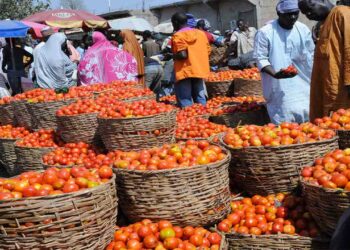Since the outbreak of the novel coronavirus in China late last year, and its subsequent ballooning into a pandemic, countries’ systems of support have continued to be tested for resilience, from health systems to economic systems, the shock and impact have been clearly devastating.
In some areas, some countries have had their support systems overwhelmed by the sheer number of infected cases and the abrupt halt of economic activities. Europe is on total lockdown, some parts of America as well. Even with their advanced systems and well-organised structures, the western world is struggling to contain the impact of COVID -19 on its populace.
As the health systems strain and buckle under the surging rate of infection, governments’ have resorted to partnering with the private sector, innovators and wealthy individuals to meet the unprecedented humanitarian situation.
Huge financial palliatives have been approved to help citizens confined indoors to get food and other essentials for as long as the shutdown will last.
Poverty capital of the world
According to the World Poverty Clock, 48% of Nigerians live in extreme poverty, which is about 95,903,776. Of that number, 55,661,428 (63%) are rural dwellers; 40,242,348 (36%) live in the cities.
48,459,331 (48%) are females and 47,444,445 (48%) are males. About four persons fall into extreme poverty every minute.
Festering Unemployment
As the world’s poverty capital, 95,903,776 Nigerians live under one dollar a day, reeling from the effects of unemployment as they basically live from hand to mouth daily.
Declaring open a two-day workshop on “Breaking the Resilience of High Unemployment Rate in the Country”, in Abuja last year, Minister of Labour and Employment, Dr Chris Ngige, noted that the rising rate of unemployment in the country at 23.1 per cent and underemployment of 16.6 per cent was alarming.
“It is a worrisome status as the global poverty capital (World Bank, 2018); and concomitant high prevalence rate of crimes and criminality, including mass murders, insurgency, militancy, armed robbery, kidnappings and drug abuse, among others.
“As if this situation is not scary enough, it is projected that the unemployment rate for this country will reach 33.5 per cent by 2020, with consequences that are better imagined, if the trend is not urgently reversed.
With the scary statistics above, what happens when there is a total lockdown, how do people cope indoors to avoid catching the dreaded virus and still have a supply of basic essentials like food among other things?
According to the (World Food Programme), avoiding protectionism, monitoring prices and supporting the vulnerable through social safety nets can limit the impact of the outbreak.
“It is still too early for an accurate assessment of the impact of COVID-19 on the economy,” says the World Food Programme (WFP)’s Chief Economist, Arif Husain, speaking from an eerily quiet, locked-down Rome. “Too much depends on what is not known — how long the outbreak lasts, how many countries it affects, and the type of policies governments will put in place to respond to the crisis.”
“What is sure is that an economic downturn is to be expected at the global level, and that this is likely to trickle down to developing economies. In these contexts, a slowdown in the economy can exacerbate existing food insecurity. It limits people’s ability to access nutritious food in different ways, including through reduced income or increased job insecurity,” Husain explains.
While the food and agricultural sector should in principle be less affected than others, illness-related labour shortages, transport interruptions, quarantine measures limiting access to markets and supply chain disruptions resulting in food loss and waste could affect supply.
Effect on supply chain
On the demand side, a loss of purchasing power caused by the disease could change people’s eating patterns, resulting in poorer nutrition. Panic purchases of food — as those recently witnessed in countries around the world — could break the supply chain and cause localized price hikes.
Apart from the food security implications of a COVID-19-triggered economic slowdown, an extensive spread of the disease in a poorer and more food insecure country could take a heavier toll on the economy than in those currently affected.
“Countries with high levels of food insecurity are generally more vulnerable and less prepared for an epidemic outbreak and would likely see higher mortality rates,” Husain notes. “In addition, malnutrition increases vulnerability to disease.”
“The economic consequences of this disease could end up hurting more people than the disease itself.”
At the same time, service industries in poorer countries are often less digitized and more reliant on face-to-face contact, meaning that containment measures, designed to limit human interaction, or avoidance by scared customers could hit harder.
In several lower-income countries — for example in Sub-Saharan Africa — a warmer climate and younger population, coupled with less dense and predominantly rural based population and more limited travel networks both within and between countries could reduce the pace at which COVID-19 spreads.
So, what is the recipe for limiting the food security impact of the current crisis?
“The COVID-19 pandemic does not necessarily have to turn into a food security crisis,” Husain says.
“The good news is that this pandemic does not necessarily have to turn into a food security crisis,” Husain says, warning that “The extent to which the COVID-19 will affect food markets is conditional upon countries staying calm even in the face of supply chain hiccups and not resorting to protective beggar-thy-neighbour policies.”
“The smooth flow of global trade will help secure food supply,” Husain notes. “And monitoring food prices and markets — an area where WFP has longstanding expertise — and sharing relevant information transparently will strengthen government policies and prevent people from panicking.”
Importantly, the most vulnerable countries and populations should be supported — not just in providing medical care, but also assistance through safety nets that have the flexibility to respond to shocks.
“With the continued support of our donors, WFP can contribute to proving this support, helping societies and families recover faster after the epidemic,” Husain concludes.
Reappraising Nigeria’s Food System
The President of All Farmers Association of Nigeria (AFAN), Arc Kabir Ibrahim has assured Nigerians that farmers are poised and fully awake to address the challenge of providing enough food to feed the nearly 200,000,000 mouths in the Nation.
He however noted the need for the federal government to urgently address management of the nation’s food system.
“Our food system must be properly reappraised to avoid any inadequacy that could cause disaster,” he warned.
Ibrahim advised that every other matter in the country should take a backseat pending the control of the coronavirus pandemic.
“The President should as a matter of urgency address the Nation on all the efforts in place and the state of preparedness in case of escalation of the pandemic,” he advised, praying that God Almighty brings the pandemic to an end soon.
The earlier government anticipates the looming danger ahead and moves with speed to address it the better for the country as a whole, not forgetting that dying from hunger may be a more imminent threat than that of COVID -19. It has the potential of triggering crime rates, causing ailments and potentially fuelling outrage.



